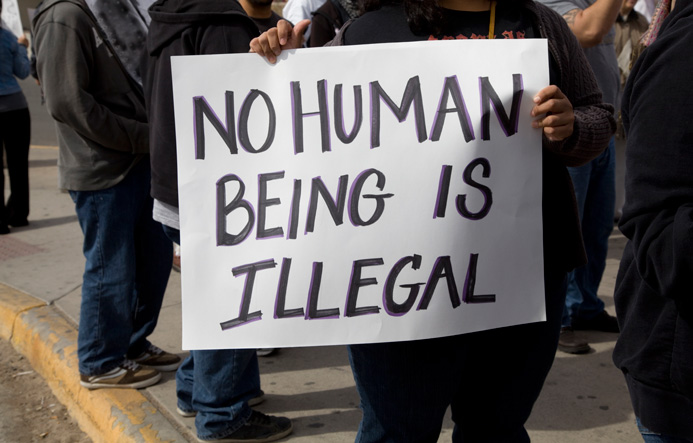The views expressed in our content reflect individual perspectives and do not represent the authoritative views of the Baha'i Faith.
I often find myself asking people how the teachings of Christ can be reconciled with some of the attitudes about refugee children from the more vocal members of our society.
One classic answer: “Well, Jesus said to ’render unto Caesar what’s Caesar’s’ and these people aren’t rendering.” The unquoted part of Christ’s statement, of course, is “and render unto God what is God’s.”
This raises a question: What do we owe government and what do we owe God?
If Christ’s and Baha’u’llah’s words inform our opinion, we owe God obedience. I suppose that leads to the next question: How do we demonstrate that obedience?
 The anti-immigrant forces seem to think that showing obedience to Caesar means showering those whom we deem disobedient with vitriol. That we should, as a people, ignore their wounds, their hunger, their thirst, their calamities, all in favor of a line on the ground drawn by our ancestors.
The anti-immigrant forces seem to think that showing obedience to Caesar means showering those whom we deem disobedient with vitriol. That we should, as a people, ignore their wounds, their hunger, their thirst, their calamities, all in favor of a line on the ground drawn by our ancestors.
Christ calls upon us to love our neighbors as we love ourselves. He makes that law one of two upon which all others depend. Moreover, Christ makes it crystal clear that by our neighbor, he does not mean only folks we consider to be part of our immediate community.
The teachings of Christ give us no wiggle room so we, as individuals and as a nation made up of individuals, can treat other human beings as if they really were what Emma Lazarus, in her world-famous poem, termed “wretched refuse”–refugees we could either throw away or allow to accumulate at the border.
Christ wasn’t the only teacher who spoke of these things. I use his words because Christianity seems the dominant belief system of most of the people engaged over this issue.
Before Christ, the Mosaic code of ethics rested on the idea that caring for the stranger was obligatory on believers because of the Hebrews sojourn in Egypt. Exodus 22:21-23 reads:
Thou shalt neither vex a stranger, nor oppress him: for ye were strangers in the land of Egypt. Ye shall not afflict any widow, or fatherless child. If thou afflict them in any wise, and they cry at all unto me, I will surely hear their cry; and my wrath shall wax hot…
The prophet Ezekiel reminds the Jews in later years why Sodom and Gomorrah became the objects of God’s wrath.
Look, this was the iniquity of your sister Sodom: She and her daughter had pride, fullness of food, and abundance of idleness; neither did she strengthen the hand of the poor and needy. And they were haughty and committed abomination before Me; therefore I took them away as I saw fit. – Ezekiel 16: 48-50.
Gautama Buddha said: “Hatred does not cease by hatred; hatred ceases by love. This is an eternal commandment.” – Dhammapada 1:5.
Muhammad framed maltreatment of the needy as making a lie of faith:
Hast thou observed him who belieth religion? That is he who repelleth the orphan, and urgeth not the feeding of the needy. Ah, woe unto worshippers who are heedless of their prayer; who would be seen (at worship) yet refuse small kindnesses! – Qur’an, Surih 107:1-7.
Baha’u’llah also sets a high bar for how we treat each other. In context with the central teaching of the Baha’i Faith that mankind is one family, Baha’u’llah wrote that his followers should:
Be generous in prosperity, and thankful in adversity. Be worthy of the trust of thy neighbor, and look upon him with a bright and friendly face. Be a treasure to the poor, an admonisher to the rich, an answerer of the cry of the needy, a preserver of the sanctity of thy pledge. Be fair in thy judgment, and guarded in thy speech. Be unjust to no man, and show all meekness to all men. Be as a lamp unto them that walk in darkness, a joy to the sorrowful, a sea for the thirsty, a haven for the distressed, an upholder and defender of the victim of oppression. Let integrity and uprightness distinguish all thine acts. Be a home for the stranger, a balm to the suffering, a tower of strength for the fugitive. – Gleanings from the Writings of Baha’u’llah, p. 80.
Do you wonder why the world has come to such a pathetic state? Why our potentially great first-world nations roil with prejudice, anger, hatred and fear that someone will take what we have? Why we fret over who deserves our love, our regard, our time, our resources, our attention?
Do you wonder why a group of people with such high ideals can strive so hard to find morally and spiritually valid reasons to treat others as aliens worthy of fear and anger?
Let’s explore those important questions a little further in the final essay in this series.
You May Also Like
Comments

















"Do you wonder why the world has come to such a pathetic state? Why our potentially great first-world nations roil with prejudice, anger, hatred and fear that someone will take what we have?"
"Elementary my dear witless" is the answer I voice to my self in response to my own similar questions.
"The fault dear Brutus..." i tell myself , is the cancer of materialism carried to excess in the North American continent and emulated in its satellites.
Little wonder Christ says that the love of ...money is the root of all evil
Though our supreme institution is divinely guided and free from error we individual Baha'is are far from perfect too when it comes to money matters. Ask the average Baha'i what he-she considers the life blood of the Cause and invariably you'll hear - MONEY donated sacrificially to the Fund. Notwithstanding money's importance that answer is a demonstrably a provable non sequitur given that 'money is the meanest of God's gifts' in the estimation of the Master
Baha'i love
Paul